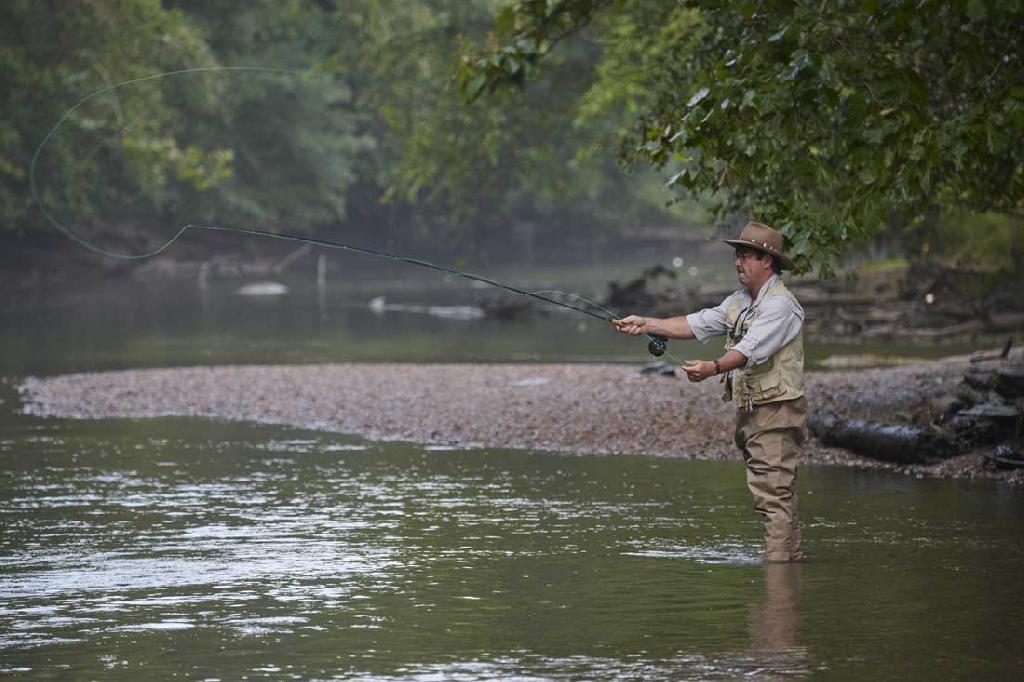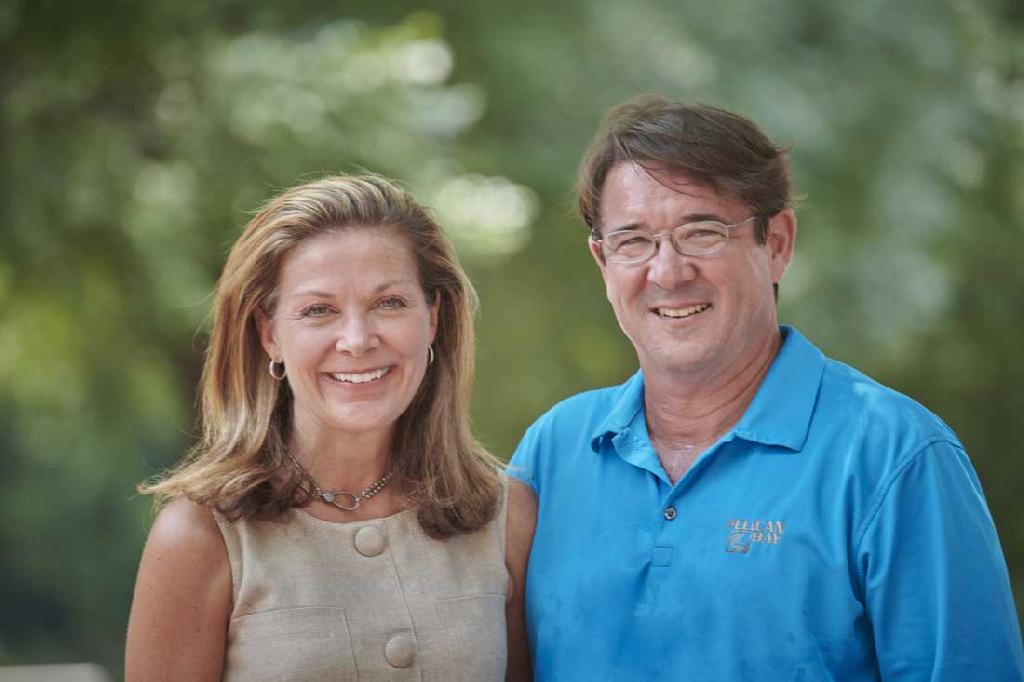Chad
Learning to Live in the Moment
“Fishing was among the first things I learned how to do with my father,” reflects Chad H. “And now when I am in the water, I think of only the best things that have been part of my life: my family − my mom and dad, my wife, my son, my daughters, and, as much as anything, my brother..”
For the last few years, the river had become one of the only places where Chad felt completely comfortable.
“When I’m on the river, I experience complete solace. I can be in the moment, not thinking about the future or the past. I hear the water, the birds, and, if I’m lucky, an otter or mink chasing us up the shoreline. If my kids or friends are with me, I enjoy nothing more than watching them have fun.”

When I’m on the river, I experience complete solace. I can be in the moment, not thinking about the future or the past.
Chad spends as much time as he can at the family home in the mountains fishing with friends and family. But, until recently, every time he inched down the driveway to return to Atlanta, he could immediately feel unease and uncertainty taking hold. It was a painful feeling that was all too familiar to him.
“Knowing I had to go home was always miserable. Real life was on the verge of taking hold, and that was always a terrible feeling.”
For as long as Chad can remember, symptoms of depression and anxiety have kept him cycling between feeling stuck in the past and fearing the future.
As a child, Chad’s family moved frequently, due to his father’s job. After each move, Chad had to put his friends, his community, and, to a great extent, his identity in the past and start over in a new place.
His younger brother, Lorne, likely struggled with the family moves as well. “We could eventually find our footing in the new schools and groups,” says Chad. “But every time we moved, Lorne was always my first and best friend. I always went out of my way to take care of him. He was everything to me.”
While Lorne used his expressive character to fit in, Chad relied almost solely on sports.
Being the quarterback in the fall and the pitcher in the spring was the easiest way to get noticed and become part of the group. “My dad always encouraged me to be a leader in that way,” says Chad.
While sports did help Chad make immediate friends and build an external identity, on the inside, his true passion was a love of music that was fostered by his mother, a very talented teacher and pianist. Chad was able to play many instruments by ear, and in high school,
he was the primary trumpet for jazz bands in Michigan and Atlanta.
While he acknowledges the important role sports have played in his life, looking back now, Chad places a higher value on music. “Had I to do it all over again, I would pick music,” he says.
Throughout Chad’s childhood and teen years, his mom was loving and supportive, and he idolized his dad. Chad did not realize until recently that his father also likely suffered from depression. Chad fondly remembers time spent with his father and brother. “He taught us so many things. He grew up in a less than desirable situation and became a self-made man, absolutely with the help of my mother. They were an outstanding team.”
A move from Michigan to Atlanta during his sophomore year of high school was particularly difficult. Starting over at The Lovett School in Atlanta, Chad’s depression hit harder than it ever had. “I spent a lot of time alone. I missed all my Michigan friends desperately. I was not prepared for Atlanta.My head was constantly down.”
After high school, Chad attended Southern Methodist University (SMU) in Texas. Chad remembers constantly working to present a façade of self-assuredness and ease to the world that he did not feel on the inside.
“The lack of self-confidence was overwhelming. I had been faking happiness and confidence since grammar school. College was merely an extension.” While he was able to establish friendships that he still values today, he always took more comfort from talking to strangers than to friends.
“I couldn’t figure out where I fit in. During my senior year, with the exception of my best friends, I had no direction,
no interests. Even in highly emotional situations, I couldn’t feel anything. Chrissy was my beacon.”
He was in a relationship with Chrissy, a young woman he had been friends with since high school who also attended SMU. Chad remembers feeling a constant and overwhelming insecurity and fear that their relationship would not last. “Depression and anxiety were more aggressively taking hold.” Shortly after graduating from college, Chad and Chrissy got married and had their first child, and then two more children. Chad recalls feeling the pressures of providing for a new family and the constant worry of possibly losing everything. I was never sure where I measured up. My thoughts of insecurity overwhelmed me.
Chad was very involved in the lives of his children, volunteering at The Lovett School and coaching sports. But rather than feeling affirmation from his involvement, internally he still felt driven by a fear of losing his family if he let anything slip. “I was always extremely paranoid of letting them down.”
Tragedy entered Chad’s life when Lorne, Chad’s brother and best friend, took his own life. Chad’s father passed just five years later of cancer. The weight of his grief was immense.
“The 2,000 pounds on my shoulders became more and more heavy,” says Chad. “I couldn’t fake it any more. I couldn’t be everything to everybody. I thought it was my fault. I didn’t know who I was.”
He tried outpatient therapy, but the sessions did not improve his symptoms or alleviate his pain. In fact, his symptoms worsened, and he was not able to sleep for months. Not sleeping concerned him.
“I had a couple of friends who had experienced the pronounced lack of sleep and ended up harming themselves. I let Chrissy know that I was very worried. Thankfully, she was very understanding.”
He decided to enter the day treatment program at Skyland Trail. He, Chrissy, and his mother had been involved with Skyland Trail as volunteers and supporters for many years. Chrissy chaired Skyland Trail’s signature fundraiser, Benefits of Laughter, in 2002.
As part of his treatment, Chad participated in transcranial magnetic stimulation treatment, or TMS. TMS is a noninvasive treatment for depression that often works when traditional medications are not effective. Chad’s depression symptoms gradually lifted.
He also participated in intensive Cognitive Behavioral Therapy, or CBT, an evidence-based therapy that is particularly effective in treating anxiety. Chad learned to use CBT skills to reframe his anxious thoughts.
“It sounds simple,” says Chad, “But it takes real work to change patterns of thinking one has developed since he was 5-years-old.”
After completing several months of intensive treatment, Chad was proud to stand up in front of his peers at graduation and reflect on his progress. He urged the younger clients to fully engage in treatment, to take the time now to learn these skills so they can take advantage of all that life has to offer. “Don’t take as long as I did to realize and ask for help with these difficult feelings,” he urged.
Today Chad says his depression is waning and he feels more in control. “When depression symptoms emerge, I can generally work my way out. I don’t have to spend weeks or months in the horrible space like I did before.”
He’s still working on anxiety, but now when he has worrisome moments he uses his CBT skills to redirect his thoughts.
“I reassure myself that nobody is in danger, nobody is hurt, and I have things to look forward to. Thinking about time with my kids always helps. Whatever that nagging thought is, I have to remember that it is not going to be the end of my world. I also have Chrissy and my mother as my biggest advocates. That is very reassuring.”
“I am among the most fortunate people in the world. I have been married 31 years to the love of my life and I have the three best and most responsible kids anyone could ever ask for. Now that I am beginning to recognize how I feel, why I feel it, and how to explain it to others, our relationships have reached a new level. I can never thank my family enough for the support each has given me.”

Today, I know I don’t need to be happy all the time, but I also know when I am unhappy, I can do something about it.
Chad feels like completing treatment has given him a second chance and that he’s “living life all over again.” He stays healthy by spending time with his family, enjoying his favorite hobbies like golf and fly fishing, working on his health and giving back to his community.
Years ago, while his children were students at The Lovett School and officers in the Vestry, Chad started accompanying the kids to Sunday dinners at Trinity House Community Ministries in downtown Atlanta. Trinity House is a residence and recovery program for men with histories of addiction, homelessness and incarceration. Chad was recently elected to the Board of Directors and visits the men at Trinity House several times a month, including participating in weekly Bible study meetings with other volunteers. He describes his relationships with the men and leaders at Trinity House as “among the most important things in my life.”
“Being a part of this community is a huge part of my own recovery and my ability to now feel good. These men need our support, our time, our contributions, and our prayers. The success rate is so much better for those who graduate from this program, and I plan to continue to work to secure futures for these courageous men.”
Before Skyland Trail, Chad was in incredible pain. “I hated waking up every morning. For no specific reason, it was literally painful to face every day. Today I know I don’t need to be happy all the time, but I also know that when I am unhappy, I can do something about it. I look forward to being happy. I can experience moments of joy and sadness, acknowledge and feel both of those emotions, and feel glad to be me, living my life and smiling more than I ever have. I am most grateful for my family and Skyland Trail. I now look forward to things as opposed to looking back. This has truly been a life saver for me.”
To learn about the Day Treatment program at Skyland Trail, please call our admissions team at 866-504-4966.
